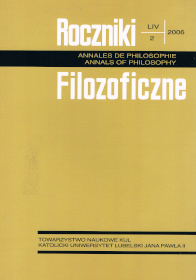Empirical Factor in E.A. Milne’s Cosmology
Abstract
This paper presents the role of the empirical factor in E.A. Milne’s hypothetico-deductivist cosmology. Two contexts of the constructing of his theory are analysed: the context of discovery and the context of justification. It is shown that in the first one empirical data (recession of the galaxies and Hubble’s law) inspired him to investigate the cosmological problem of the phenomenon of the expanding Universe and influenced him to put forward the hypotheses: uniform velocities of fundamental particles, Cosmological Principle, and Lorentz transformation. Milne emphasised that in the procedure of justification the completed theoretical cosmological models should be tested. The empirical factor plays the most significant role in this procedure because the empirical data are the ultimate basis for confirmation or falsification of the cosmological models.
References
Bondi H.: Cosmology, Cambridge University Press, Cambridge 19612 (pol.: Kosmologia, tł. E. i A. Białas, PWN, Warszawa 1965.
Bondi H.: Some Philosophical Problems in Cosmology, [w:] C. A. Mace (ed.), British Philosophy in the Mid-Century, George Allen and Unwin, London 1957, s. 195-201.
Brown B. G.: The Philosophies of Science of Eddington and Milne, „American Journal of Physics” 17 (1949), s. 553-558.
Dingle H. (ed.): The Evolution of the Universe, Supplement to „Nature”, October 24, 128 (1931), s. 715-718.
Dingle H.: On E.A. Milne’s theory of world structure and the expansion of the universe, „Zeitschrift für Astrophysik” 7 (1933), s. 167-179.
Gale G., Shanks N.: Methodology and the Birth of Modern Cosmology, „Studies in History and Philosophy of Modern Physics” 27 (1996), B, s. 279-296.
Gale G., Urani J. R.: Milne, Bondi and the ‘Second Way’ to Cosmology, [w:] H. Goenner, J. Renn, J. Ritter, T. Sauer (eds), The Expanding Worlds of General Relativity („Einstein Studies”, vol. 7), The Center for Einstein Studies 1999, s. 343-375.
Goldsmith D.: Einstein’s Greatest Blunder? The Cosmological Constant and Other Fudge Factors in the Physics of the Univers, Harvard University Press 1995 (pol.: Największa pomyłka Einsteina? Stała kosmologiczna i inne niewiadome w fizyce Wszechświata, tł. B. Bieniok i E. L. Łokas, Prószyński i S-ka, Warszawa 1998).
Hajduk Z.: Filozofia przyrody – Filozofia przyrodoznawstwa: Metakosmologia, TN KUL, Lublin 2004.
Harder A.J.: E.A. Milne, Scientific Revolutions and the Growth of Knowledge, „Annals of Science” 31 (1974), s. 351-363.
Mazierski S.: Charakterystyka i kierunki rozwoju kosmologii przyrodniczej, „Roczniki Filozoficzne” 18 (1970), z. 3.
McCrea W. H.: The Evolution of Theories of Space-Time and Mechanics, „Philosophy of Science” 6 (1939), 137-162.
Merleau-Ponty J.: Cosmologie du XXe siècle, Gallimard, Paris 1965.
Milne E. A.: Cosmological Theories, „The Astrophysical Journal” 91 (1940), s. 129-158.
Milne E. A.: Kinematic Relativity, Clarendon Press, Oxford 1948.
Milne E. A.: Kinematic Relativity. A reply to Professor W. Wilson, „Philosophical Magazine and Journal of Science” 36 (1945), No. 7, s. 134-143.
Milne E. A.: Kinematics, Dynamics and the Scale of Time, „Proceedings of the Royal Society of London” 158 (1937), A, part I, s. 324-348.
Milne E. A.: Modern Cosmology and the Christian Idea of God, Clarendon Press, Oxford 1952.
Milne E. A.: Note on H.P. Robertson’s paper on World-Structure, „Zeitschrift für Astrophysik” 7 (1933), s. 180-187.
Milne E. A.: On the Origin of Laws of Nature, „Nature” 139 (1937), s. 997-999.
Milne E. A.: Rational electrodynamics. The Limitations of Classical Electromagnetism, „Philosophical Magazine and Journal of Science” 34 (1943), No. 7, part I, s. 73-82.
Milne E. A.: Relativity, Gravitation and World-Structure, Oxford University Press, Oxford 1935.
Milne E. A.: Some Points in the Philosophy of Physics: Time, Evolution and Creation, „Philosophy” 9 (1934), s. 19-38.
Milne E. A.: The Aims of Mathematical Physics, Oxford 1929 – streszczenie wykładu zdeponowane w Royal Astronomical Society, s. 3-28.
Milne E. A.: The Fundamental Concepts of Natural „Philosophy”, „Proceedings of the Royal Society of Edinburgh” 62 (1943), s. 10-24.
Milne E. A.: World-Models and World-Picture, „The Observatory” 57 (1934), s. 24-27.
Milne E. A.: World-Structure and the Expansion of the Universe, „Zeitschrift für Astrophysik”, 6 (1933), s. 1-95.
Such J.: O uniwersalności praw nauki, PWN, Warszawa 1972.
Tempczyk M.: Kosmologia jako samodzielna nauka przyrodnicza, „Człowiek i Światopogląd” 11 (1986), s. 74-89.
Tempczyk M.: Związek fizyki z kosmologią, „Studia Filozoficzne” 2 (1988), s. 55-66.
Tolman R. C.: Models of the Physical Universe, „Science” 75 (1932), s. 367-373.
Turek J.: Albert Einstein prekursorem hipotetyzmu Karla Poppera, „Roczniki Filozoficzne” (złożone do druku).
Turek J.: Czynnik empiryczny w teoriach kosmologicznych, „Roczniki Filozoficzne” 41 (1993), z. 3, s. 5-47.
Urani J. R., Gale G.: E.A. Milne and the Origins of Modern Cosmology: An Essential Presence, [w:] J. Earman, M. Janssen, J. D. Norton (eds), The Attraction of Gravitation: New Studies in the History of General Relativity, (Einstein Studies, vol. 5), Birkhäuser, Boston 1994, s. 390-419.
Whitrow G. J.: E.A. Milne and Cosmology, „Quarterly Journal of the Royal Astronomical Society” 37 (1996), s. 365-367.
Whitrow G. J.: E.A. Milne’s Cosmology, [w:] N. S. Hetherington (ed.), Encyclopedia of Cosmology: Historical, Philosophical, and Scientific Foundations of Modern Cosmology, Garland, New York 1993, s. 410-416.
Wilson W.: Kinematic Relativity, „Philosophical Magazine and Journal of Science” 35 (1944), No. 7, s. 241-249.
Wilson W.: Kinematic Relativity, „Philosophical Magazine and Journal of Science” 37 (1946), No. 7, s. 421-426.
Copyright (c) 2006 Roczniki Filozoficzne

This work is licensed under a Creative Commons Attribution-NonCommercial-NoDerivatives 4.0 International License.





